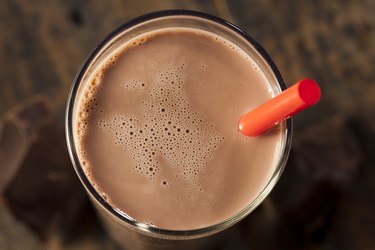
Diets promising quick weight loss always seem to make a splash, and the Optavia diet is no exception. But just because a diet is popular doesn't mean it actually works. And in some cases, a buzzy diet may do you more harm than good.
Here, the experts explain why Optavia may help you lose weight, but it's probably not the best bet to help you drop pounds in a healthy, sustainable and cost-effective way.
Video of the Day
Video of the Day
So, What's the Optavia Diet?
The Optavia diet is a weight-loss program designed by the creators of the Medifast diet, a meal-replacement plan that touts low-fat, low-calorie and low-glycemic foods. The Optavia plan also encourages followers to eat six meals per day but, by contrast, it sells pre-packaged, portion-controlled "fuelings" that are low in carbs, high in protein and fiber and low in calories. Dieters are encouraged to incorporate these packaged items along with "lean and green" meals consisting of protein and vegetables, and to work with an Optavia coach to lose weight.
The "fuelings" include snack bars and shakes, and a typical, homemade "lean and green" meal should include 5 to 7 ounces of protein and three servings of veggies, says Laura Farrell, RD, CDN, a dietitian with NY Nutrition Group.
There are three plan options:
- 5&1 plan: Five Optavia fuelings and one lean and green meal daily
- 4&2&1 plan: Four Optavia fuelings, two lean and green meals and one healthy snack per day
- 3&3 plan: Three Optavia fuelings and three lean and green meals each day
"Most of the lean and green meals are 300 calories or less, and the fuelings are even less calories," says NYC-based dietitian Natalie Rizzo, RD. So the diet definitely slashes calories to get the desired results.
The plan also encourages everyone to exercise for 30 minutes per day to speed up the weight-loss process.
Does It Work for Weight Loss?
Because the foods you're eating are portion-controlled and low in calories, it's likely that you'll lose weight following this plan, simply from the calorie deficit.
"It can deliver short-term weight loss without straying wildly from accepted nutritional standards," says Niket Sonpal, MD, an NYC-based internist and gastroenterologist, and a faculty member at Touro College of Medicine. "The Optavia diet is what's considered a high-protein diet, with protein making up 10 to 35 percent of your daily calories."
Still, it's probably not a long-term solution to weight loss.
"Some people like to have rules and regulations and feel a bit overwhelmed when they have to make their own choices," Dr. Sonpal says. So, he says, if this diet can help you jumpstart weight loss, then go for it. Just don't expect it to work forever, because it's not sustainable.
Read on for six reasons the diet falls short.
Read more: How to Find the Best Weight-Loss Diet for You

Is It Healthy, or Just a Fad Diet?
Some parts of Optavia encourage positive eating habits, like making meals with whole foods. But overall, there are many more drawbacks than benefits:
1. It's too restrictive. "The diet excludes things such as whole grains, fruits and legumes, which contain vitamins and minerals essential to one's health," Farrell says. This restriction mindset can also later result in cravings and binging, which is why it's unlikely the weight loss will be sustainable for the long-term.
2. It relies too heavily on protein powder and dietary supplements. "There are some protein isolates added to the fueling meals, which may cause stomach issues for some people," Rizzo says. Plus, the plan promotes high consumption of dietary supplements, which are not regulated by the FDA, meaning that there's no guarantee that they're safe or effective.
3. It's not based in science. "The Optavia diet fits more into the fad diet category as it promises weight loss following the implementation of non-evidence-based dietary restrictions," Farrell says. In other words, there's no research to support that this type of plan will help you lose weight in a healthy way and keep it off.
4. It's expensive. "Fuelings" packages will cost you several hundred dollars a pop, and you still have to grocery shop for your "lean and green" meals. "I don't think it's sustainable to buy all of your meals from this program all of the time," Rizzo says.
5. It's not flexible. "It doesn't allow any room in the diet to eat out with friends or have a quick grab-and-go option if you forget to pack something from the Optavia plan," Rizzo says. That kind of rigidness makes it hard to stick with the plan without dramatically changing your social life.
6. It cuts calories too low. "It's really low in calories (around 1,000 per day), so I think anyone following it would be pretty hungry throughout the day," Rizzo says.
Tip
Women shouldn't eat less than 1,200 calories per day, and men shouldn't fall below 1,500, according to Harvard Health Publishing. Dropping below these numbers could put you at risk for nutritional deficiencies and also slow down your metabolism.
In short, this isn't the healthiest diet out there, and you'd be better off opting for the Mediterranean diet or the Nordic diet, both of which focus on whole foods and not caloric restriction or processed meals.
"I think there are healthier ways to lose weight, such as making your own portion-controlled meals and eating a well-balanced diet with whole foods," says Rizzo, noting that a balanced diet includes whole grains, fruits, veggies, legumes, dairy, lean meats, seafood, eggs and healthy fats, alongside a few mindful indulgences.
Should Anyone Not Try Optavia?
Certain people shouldn't try this diet for health reasons.
"If you have a certain health condition that affects your diet, like diabetes, IBS or celiac, then this isn't the diet plan for you because you need to choose the ingredients that go into your meals," Rizzo says.
The same goes for women who are pregnant or who just had a child. "The diet clocks in around 1,000 to 1,100 calories per day, which is really low and would be entirely too low for anyone who is pregnant or breastfeeding," she adds.
"It's also important to note that since the supplement ingredients are not regulated there could be potential food-drug interactions, so for those taking certain medications it is important to proceed with extreme caution," Farrell says.
Always consult a physician first before starting any new diet plan to make sure it's safe and the right option for you.
Was this article helpful?
150 Characters Max
0/150
Thank you for sharing!
Thank you for your feedback!